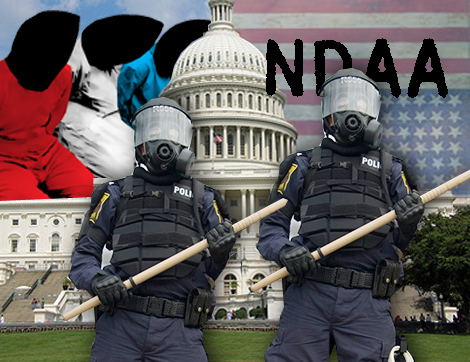
By Mark Anderson
WASHINGTON, D.C.—The Senate on December 4 passed S. 3254, the Fiscal Year 2013 National Defense Authorization Act (NDAA), with a 98-0 vote, which is the routine annual funding of the massive U.S. military establishment. The bill contained a controversial and perhaps unanticipated amendment introduced by Sen. John McCain (R-Ariz.) that Sen. Rand Paul (R-Ky.) saw as a subtle move toward war on Syria without having to make an open declaration to do so.
“Our citizens and our soldiers are weary of war,” Paul pleaded, just before the 92-6 approval of amendment No. 3262, as this AFP writer attended the proceedings.
And those same citizens, at least according to language in this latest defense authorization bill, have less cause for concern about being detained indefinitely without trial or legal counsel if they are deemed by United States authorities to be in league with terrorists during the “war on terror.” This is a sharp reversal from the 2012 NDAA approved late last year, as that bill contained language that left the door open for such indefinite detention. That threat of detention sparked widespread concern over the loss of fundamental human rights.
Paul was among the six senators who voted against McCain’s amendment. The others were Sens. Lamar Alexander (R-Tenn.), Jim DeMint (R-S.C.), Richard Durbin (D-Ill.), Kay Bailey Hutchison (R-Texas), and Mike Lee (R-Utah.) And this amendment, as noted by McCain, “shall remain in classified form,” away from public scrutiny—even while McCain and Sen. Joseph Lieberman (I-Conn.) pontificated about the endless evils of Syrian president Bashar al-Assad and the Republic of Iran.
The amendment calls on the Department of Defense to “submit a report” on contemplated U.S. “military activities” designed “to deny, significantly reduce or degrade” the Syrian president’s ability “to use air power against civilians and opposition groups,” according to the bill.
Absent from the heated comments that led to the amendment’s passage—right after the Senate had invoked cloture to limit amendments to S. 3254 itself—was evidence previously reported by AMERICAN FREE PRESS that the Syrian situation is actually an organized insurrection against Assad, aided and abetted by Western intelligence and, with the help of big-media distortion, made to look like a genuine grassroots uprising.
The same deception was carried out in the sacking of Libya, where various factions were organized and armed with new North Atlantic Treaty Organization (NATO) firearms and carried out an insurrection to topple a leader who fell into disfavor with the hegemonic West, under the guise of a real uprising against tyranny.
On the Senate floor December 4, it was clear that the partisanship that is said to be the enemy of legislative progress posed no problem for Sen. Carl Levin (D-Mich.), who agreed with every word that McCain said. Levin added that America needs to create conditions in Syria “for a Democratic and pluralistic political system.”
Such claims were heard regarding Libya, as well. And now, much like what was said about Iraq before the U.S. attacked it—that it was the very epicenter of “weapons of mass destruction”—McCain invoked the specter of Syria stockpiling large supplies of deadly sarin gas.
“If military action is taken [to prevent] sarin gas from being used,” McCain intoned, “Congress needs to be made aware of not what we should do, but what we can do.”
This careful wording could be interpreted as leaving room for war on Syria without being too explicit.
Lieberman was even more explicit, saying the study will explore “using patriot antimissile batteries” and “firing [U.S.] precision-guided missiles from offshore” to take out Syrian “air forces” that allegedly are bombing Syria’s own people.
“All of this should be considered as part of the study,” Lieberman stressed.
INDEFINITE DETENTION RELAXED?
The wording of Sec. 1033 of S. 3254 states that it prohibits the indefinite jailing of Americans without trial or legal counsel. The title of Sec. 1033 reads: “Prohibition on the indefinite detention of citizens and lawful permanent residents.”
The rest of the section (amending section 4001 of title 18, United States Code) goes on to say: “An authorization to use military force, a declaration of war, or any similar authority shall not authorize the detention without charge or trial of a citizen or lawful permanent resident of the United States apprehended in the United States, unless an Act of Congress expressly authorizes such detention.”
So while Congress could conceivably pass a law that would restore extended detention, the new relaxed stance in S. 3254 regarding indefinite detention “applies to an authorization to use military force, a declaration of war, or any similar authority enacted before, on, or after the date of the enactment of the National Defense Authorization Act For Fiscal Year 2013,” Sec. 1033 specifies.
And that section stresses that nothing shall be construed “to authorize the detention of a citizen of the United States, a lawful permanent resident of the United States, or any other person who is apprehended in the United States.”
Passed in the House as H.R. 4310, the NDAA, after the Senate approved it, was sent to the House-Senate conference committee to iron out differences.
Mark Anderson is AFP’s roving editor. Listen to Mark’s weekly radio show and email him at [email protected].


